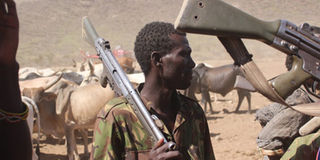Possessing firearms a treasure for banditry-ravaged pastoral communities

Herders guarding their animals. For them, owning a gun is a treasure as they have to keep engaging attackers in the unending animal raids. FILE PHOTO | NATION MEDIA GROUP
What you need to know:
- These herders normally don jungle green attire which camouflages with the environment.
- Reports also indicate that in some market places, bullets are sold just like maize.
- Banditry in Baringo started in the 1950s and, up to now, little has been done to curb this retrogressive culture.
Possessing a firearm among herders in the banditry-ravaged communities is a treasure.
Whenever you meet them, boys as young as eight clutch to the sophisticated guns with confidence as they herd animals.
These herders normally don jungle green attire which camouflages with the environment.
Most likely, these firearms include those stolen from security personnel killed by bandits.
Whenever they go for a raid, if by any chance they kill or are killed, the survivors will not bother to carry the dead bodies but, instead, they will go for the guns of those killed.
If the victims are security personnel, the raiders also strip them of uniform besides their ammunition.
FERRY AMMUNITION IN JERRYCANS
Intelligence reports reveal that, depending on the quantity, they ferry the ammunition in jerrycans usually used for carrying water.
Such business is done at night so as not to raise any suspicions.
Reports also indicate that in some market places, bullets are sold just like maize, according to quantity and sometimes weight of the containers used for measuring.
Sources reveal that the said bandits get intelligence reports warning them of pending operations hence they flee to their hideouts.
The rugged terrain is normally conducive for them to hide and ambush security officers, thus making it difficult to fight cattle rustling and banditry.
There have been claims that some leaders from the affected areas are among the financiers and the immediate beneficiaries of the cattle raids, with the stolen livestock finding its way into markets in major town and cities.
Banditry in Baringo started in the 1950s and, up to now, little has been done to curb this retrogressive culture and the situation is getting out hand because the affected communities keep retaliating.





